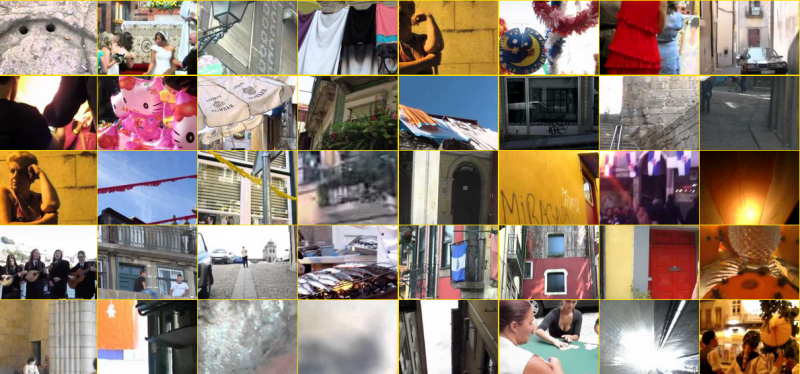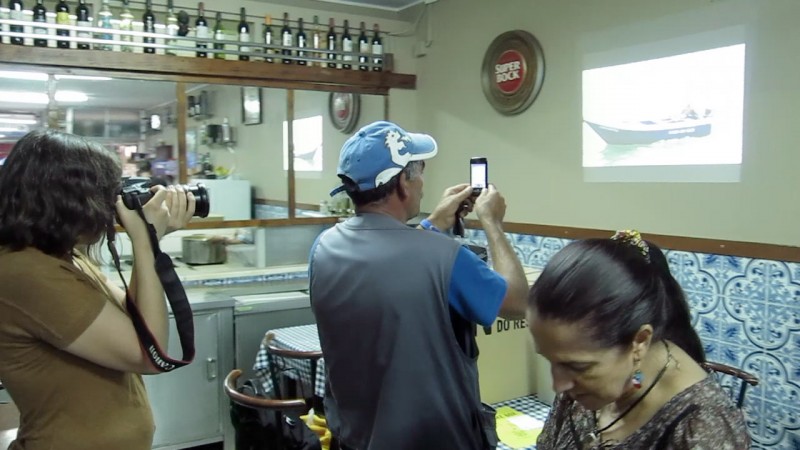
“Rescuing is the real question! Rescue testimonies of ancient history, the most important people in your life, homey and family moments, events in the street. Everything over and above stones and walls of Oporto's historical centre. The card and domino games in the city's garden, children playing soccer in the squares, talks through window, dives into river, the discussions about politics between adults and their willingness to change the world”. Photo: vídeos mosaic on website museudoresgate.org
The Museum of Ransom proposes to document the legacy of the local culture in Porto's historical centre through the use of video. The Museum has become an “online space that aims to aggregate homemade, domestic, mundane amateur videos” that capture the daily essence of the area of the Portuguese city classified as a World Heritage site by UNESCO.
The creator of this digital repository, Daniel Brandão, a doctoral researcher on Digital Media at Porto University in partnership with The University of Texas – Austin, explains during an interview to Global Voices that this “museum metaphor” can be “a space used simultaneously for expression, creation or denunciation by citizens [pt].”
Why do these histories from Porto's centre need to be “rescued”?
Brandão:
There are several reasons why the universe of narratives of Porto's historical centre remains hidden. On the one hand, the low population density in the main parishes, as well as the aging resident population have contributed to the dispersion of these communities that leads to the loss of many memories that don't pass along to the next generations. On the other hand, these people who live in Porto's historical centre don't have easy access to digital documentation tools or do not use them to make or share home videos. Furthermore, I've realized throughout this project that in Portugal we don't have the habit of sharing online our homemade moments that have been recorded in video, in contrast to what happens in other countries.
In order to counter this trend, the Museum of Ransom invites residents and visitors from these parishes to share their own local perspectives. Since the creation of this project in June 2012, over 900 videos have been “rescued,” all of them in raw format that still needs to be edited, “and directed by various people with different technical abilities, and often without an aesthetic pretension or narrative a priori.”
Among the selection of video recordings that the museum has been aggregating, Daniel considers that a lot of interesting pictures arise, “either because they bring us memories, or they bring stories with them, or they illustrate different aesthetics, points of view or forms of expression.” Also he noticed the difference between the views shared by local residents and the visitors that view the videos:
Brandão:
The trend has been that visitors take part in a non-participatory way, keeping some distance from those who are filming, while the people from parishes often interact with others or show an affective relationship with what they are filming, by adopting, for instance, narration techniques.

(Center Photograph) One of the many subjects of Porto's historical centre that was captured in video – the pilot of the boat Lobo do Mar (Sea Wolf) – takes a picture of his own video projection at one of the “Video Juke Box” sessions. The sessions were organized by the Museum of Ransom to present the project at small local diners and cafes in Porto's downtown. Watch the video below.
Creating new narratives
Apart from aggregating and exposing “videos lost in time and space” (which result in “the growth of a vast audiovisual archive, dispersed and unstructured in online platforms such as YouTube”), the museum also aims to “offer [the videos] new meanings and values once they are reinterpreted and put in a sequence to produce new narratives”.
This was the theme of the workshop that took place over two afternoons in early November, and arranged by the Museum of Ransom under the scope of “Future Places“, an annual digital media festival reinvented this year as a “medialab for citizenship” in Porto.
Aiming to “provoke the creation of readings, narratives using videos as raw material” from the museum's archives, the workshop objective was to give new meanings to some of the pieces exhibited in the museum:
Brandão:
We try to understand how this amateur and participatory documentation can be valued, structured by getting a sense of what may be lacking to make it happen, and once again, with the help of the citizens.
The workshop proposed the use of YouTube's online editing tool, where all videos are available under a Creative Common license (and thus reusable by any user of the platform), so that the participants could build new narrative sequences from the raw footage.
Building on the example of a sequence of videos from the Museum of Ransom's archives, which features a group of women playing cards in the open air neighborhood of Sé. (see parts one, two, three, four, five, six), this video below was quickly created using the YouTube editing tool. The footage emphasizes the typical slang of Porto's people, where one can hear in side conversations in the background, and the isolation of framing which values the quick movements of the players’ hands:




1 comment